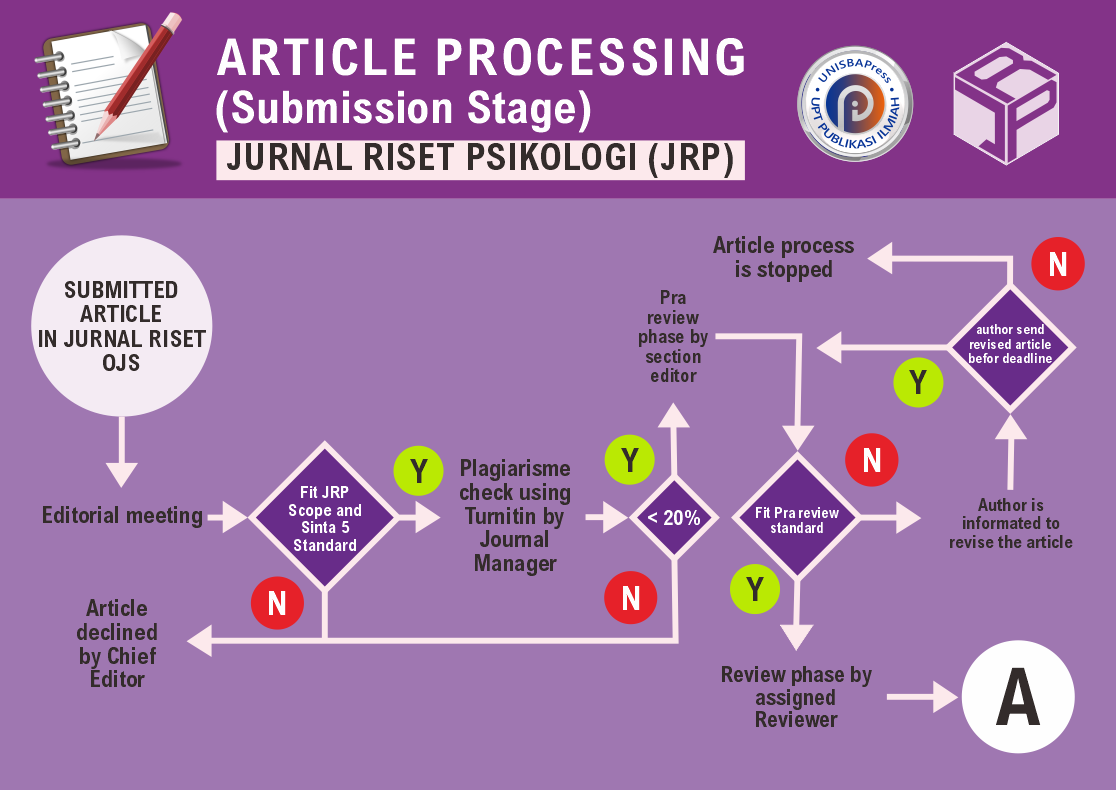Penyusunan Alat Ukur Prososial Remaja
DOI:
https://doi.org/10.29313/jrp.v2i2.1598Keywords:
Perilaku prososial, Reabilitas, ValiditasAbstract
Abstract. The behavior of not caring about friends who get bullied or who have difficulties, consumptive and hedonic lifestyles make teenagers more individualistic and very less practice prosocial behaviors. The following research aims to develop a prosocial measurement tool in adolescents. The prosocial dimensions include sharing, helping, cooperating, acting honestly, and giving charity. This study involved 95 high school students in a school in Jakarta. The results of the content validity test using the expert judgment method showed that 50 items in the form of a Likert scale (score 1 = never – score 5 = very often) passed representing the domain of prosocial behavior. The results of the construct validity test with the corrected item-total correlation method showed 45 items were classified as valid (r = 0.28 – 0.68). The results of the reliability test using the Cronbach’s Alpha method show that the measuring instrument is classified as reliable with a coefficient of 0.93. The easuring instrument is ready to be used for further research.
Abstrak. Perilaku tidak peduli terhadap teman yang di-bully atau yang mengalami kesulitan, gaya hidup konsumtif dan hedonis membuat remaja lebih individualistis dan sangat kurang mempraktekkan perilaku prososial. Penelitian berikut bertujuan untuk mengembangkan alat ukur prososial pada remaja. Dimensi prososial meliputi berbagi, membantu, bekerja sama, bertindak jujur, dan memberi sedekah. Penelitian ini melibatkan 95 siswa SMA di salah satu sekolah di Jakarta. Hasil uji validitas isi dengan metode expert judgement menunjukkan bahwa 50 item berbentuk skala likert (skor 1 = tidak pernah – skor 5 = sangat sering) lulus mewakili ranah perilaku prososial. Hasil uji validitas konstruk dengan metode korelasi item-total terkoreksi menunjukkan 45 item tergolong valid (r = 0,28 – 0,68). Hasil uji reliabilitas dengan metode Cronbach’s Alpha menunjukkan bahwa alat ukur tergolong reliabel dengan koefisien 0,93. Alat ukur siap digunakan untuk penelitian selanjutnya.
References
M. Budiarti, “Mengurai Konsep Dasar Manusia sebagai Individu melalui Relasi Sosial yang Dibangunnya,” in Prosiding KS: Riset & PKM, pp. 1–40.
D. Baron, R.A. & Byrne, Psikologi sosial. Jakarta: Erlangga, 2005.
J. Killen, M. & Smetana, Handbook of Moral Development. Lawrence Erlbaum Associates, Inc, 2006.
P. H. Eisenberg, N., & Mussen, The roots of prosocial behavior in children. Cambridge University Press, 1989.
H. UGM, “Pandemi dan Revitalisasi Karakter Prososial bangsa,” 2020.
Sugiyono, Metode Penelitian Kuantitatif, Kualitatif, dan R & D. Alfabeta, 2011.
E. Nugroho, Prinsip-Prinsip Menyusun Kuesioner. UB Press, 2018.
Sarah Khairunnisa Zahrani and Farida Coralia, “Tingkat Ekspresi Emosi pada Caregiver Skizofrenia di Kecamatan Kersamanah, Kabupaten Garut,” J. Ris. Psikol., vol. 1, no. 2, pp. 119–123, Feb. 2022, doi: 10.29313/jrp.v1i2.557.
T. M. Ingarianti, “Pengembangan alat ukur komitmen organisasi,” J. RAP (Riset Aktual Psikol. Univ. Negeri Padang), vol. 6, no. 1, pp. 80–91, 2017, doi: https://doi.org/10.24036/rapun.v6i1.6652.
S. Azwar, Reabilitas dan Validitas. Pustaka Belajar, 2012.













